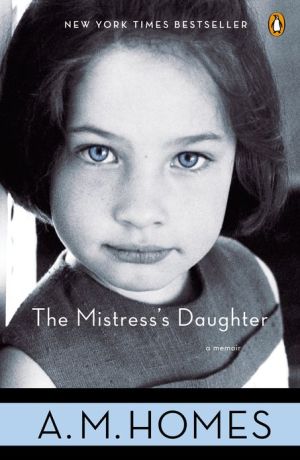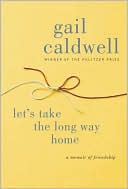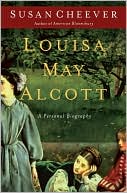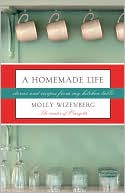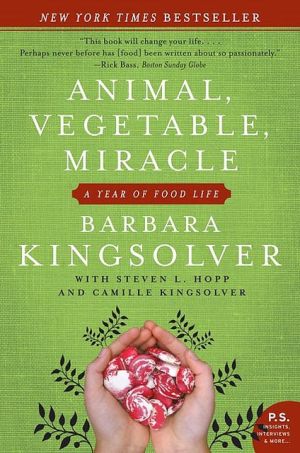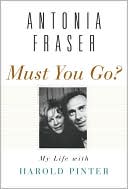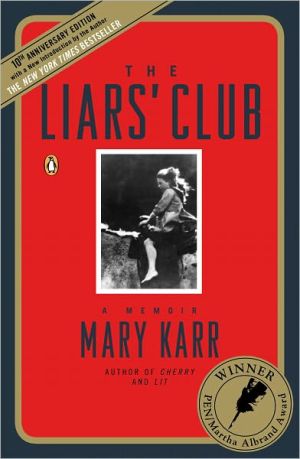The Mistress's Daughter
The acclaimed writer A. M. Homes was given up for adoption before she was born. Her biological mother was a twenty-two-year-old single woman who was having an affair with a much older married man with a family of his own. The Mistress's Daughter is the ruthlessly honest account of what happened when, thirty years later, her birth parents came looking for her. Homes relates how they initially made contact and what happened afterwards, and digs through the family history of both sets of her...
Search in google:
An acclaimed novelist's riveting memoir about what it means to be adopted and how all of us construct our sense of self and family Before A.M. Homes was born, she was put up for adoption. Her birth mother was a twenty-two- year-old single woman who was having an affair with a much older married man with children of his own. The Mistress's Daughter is the story of what happened when, thirty years later, her birth parents came looking for her. Homes, renowned for the psychological accuracy and emotional intensity of her storytelling, tells how her birth parents initially made contact with her and what happened afterward (her mother stalked her and appeared unannounced at a reading) and what she was able to reconstruct about the story of their lives and their families. Her birth mother, a complex and lonely woman, never married or had another child, and died of kidney failure in 1998; her birth father, who initially made overtures about inviting her into his family, never did. Then the story jumps forward several years to when Homes opens the boxes of her mother's memorabilia. She had hoped to find her mother in those boxes, to know her secrets, but no relief came. She became increasingly obsessed with finding out as much as she could about all four parents and their families, hiring researchers and spending hours poring through newspaper morgues, municipal archives and genealogical Web sites. This brave, daring, and funny book is a story about what it means to be adopted, but it is also about identity and how all of us define our sense of self and family. The New York Times Book Review Fierce and eloquent.
Book 1The Mistress's Daughter 3Book 2Unpacking My Mother 109The Electronic Anthropologist 143My Father's Ass 183Like an Episode of L.A. Law 203My Grandmother's Table 223Acknowledgments 239
\ From Barnes & NobleLike many adopted children, novelist A. M. Homes grew up steeped in romantic fantasies about her origins. Having once imagined herself the love child of Susan Sontag and Jack Kerouac, she was sadly disillusioned when, at age 31 she met her birth parents for the first time. A far cry from Sontag, her mother was a lonely, overwhelmingly needy woman with (at best) a tenuous grasp on reality. Her father, though far more grounded, was an even bigger disappointment: After promising to make her part of his family, he never followed through -- a slight that first wounded, then enraged his long-lost daughter. In this rueful memoir, as disturbing and emotionally intense as any of her fiction, Homes mines the twin landscapes of adoption and identity and finally discovers, deep within herself, the true meaning of family and belonging.\ \ \ \ \ Katie RoipheAs a novelist, A. M. Homes has made a minor speciality of luridness. In all of her writing there is a latent sense that a crime has been or is about to be committed. Her memoir, The Mistress's Daughter, is no exception: it has the same foreboding, the same ambience of barely controlled menace. It opens with the sentence: "I remember their insistence that I come into the living room and sit down and how the dark room seemed suddenly threatening, how I stood in the kitchen doorway holding a jelly doughnut and how I never eat jelly doughnuts." And as Homes moves through her account of her origins, the prevailing mood is that of film noir.\ — The New York Times\ \ \ JaneKnocks you on your ass with insights that remind why A.M. is a master.\ \ \ \ \ Entertainment WeeklyA powerful examination of family and self, of the adopted versus the biological.\ \ \ \ \ People MagazineRiveting.\ \ \ \ \ BookforumHomes evokes a surreal, at times harrowing quest for self-discovery and the meaning of family.\ \ \ \ \ St. Louis Post DispatchAn absorbing account of Homes' struggle to understand who, at multiple levels, she is...unsparing in its honesty and vivid in its detail.\ \ \ \ \ GlamourMesmerizing...Homes explores how parents do-or in some cases don't-shape our lives.\ \ \ \ \ RedbookA devastating yet powerful identity search.\ \ \ \ \ Atlanta Journal ConstitutionHere is a family drama as a kind of emotional detective story...a truthful, agonizing story of one woman's search for a narrative life raft.\ \ \ \ \ Elle MagazineAn unflinching exploration of the complex emotions surrounding Homes's brief contacts with her birth parents.\ \ \ \ \ Harpers BazaarFearless and emotionally searing.\ \ \ \ \ More MagazineHer best book...Homes brings her writer's eye for the painfully absurd to her own compelling story.\ \ \ \ \ The Atlantic MonthlyDiamond-hard, with flashes of humor as well as brightness...a story to treasure.\ \ \ \ \ The San Francisco ChronicleAs startling and riveting as her fiction...a lacerating memoir in which the formerly powerless child triumphs with the help of a mighty pen.\ \ \ \ \ Chicago TribuneAs a memoirist, A. M. Homes takes a characteristically fierce and fearless approach. And she has a whopper of a personal story to tell.\ \ \ \ \ USA TodayRich in humanity and humor . . . Homes combines an unfussy candor with a deliciously droll, quirky wit. . . . Her energy and urgency become infectious.\ \ \ \ \ San Francisco ChronicleAs startling and riveting as her fiction . . . a lacerating memoir in which the formerly powerless child triumphs with the help of a mighty pen.\ \ \ \ \ The New York Times Book ReviewFierce and eloquent.\ \ \ \ \ Publishers WeeklyNovelist Homes's searing 2004 New Yorkeressay about meeting her biological parents 31 years after they gave her up for adoption forms the first half of this much-anticipated memoir, but the rest of the book doesn't match its visceral power. The first part, distilled by more than a decade's reflection and written with haunting precision, recounts Homes's unfulfilling reunions with both parents in 1993 after her birth mother, Ellen Ballman, contacted her. Homes (This Book Will Change Your Life,) learns that Ballman became pregnant at age 22, after being seduced by Norman Hecht, the married owner of the shop where Ballman worked. But Ballman's emotional neediness and the more upwardly mobile Hecht's unwillingness to fully acknowledge Homes as a family member shakes Homes's deepest sense of self. The rest of the memoir is a more undigested account of how Ballman's death pushed Homes to research her genealogy. Hecht's refusal to help Homes apply to the Daughters of the American Revolution based on their shared lineage elicits her "nuclear-hot" rage, which devolves into a list of accusing questions she would ask him about his life choices in a mock L.A. Law episode. The final chapter is a loving but tacked-on tribute to Homes's adoptive grandmother that may leave readers wishing the author had given herself more time to fully integrate her adoptive and biological selves. (Apr.)\ Copyright 2006 Reed Business Information.\ \ \ \ \ Library JournalIn this nonfiction work, part of which previously appeared in The New Yorker, novelist Homes (In a Country of Mothers) explores her roots. At first, all she knew about her parentage was that she was adopted. But when she was 31, her birth mother reappeared, wanting to become involved in her life. Piece by piece, Homes learned more about her birth parents' lives, though their versions do not always match. She began to realize that her part in their relationship was almost incidental; both were more concerned with their own needs than with hers. Yet she was still compelled to try to understand their background and motivations, no matter how emotionally trying and painful. Homes draws you in from the first sentence and holds your interest throughout, sharing her fear, disappointment, pathos, and bathos. She creates a possible deposition scene with her birth father that is both devastating and brilliant, covering all the ground she has unearthed in her explorations. By the end, you'll feel glad that nurture rather than nature has been dominant in her upbringing. Highly recommended for all libraries. [See Prepub Alert, LJ12/15/06.]\ —Gina Kaiser\ \ \ \ \ Kirkus ReviewsAdopted as a newborn, novelist Homes (This Book Will Save Your Life, 2006, etc.) finally meets her biological parents. The author embarked on this journey of self-discovery after being contacted by her biological mother, who gave birth to Homes as a result of an affair with her married employer at a Washington, D.C., dress shop. Ellen Ballman never wed, and she appears a lonely, erratic and needy lost soul to her 31-year-old daughter. Uneasy and frightened, Homes pushes her away, basically avoiding all but sporadic telephone contact after one face-to-face meeting. Upon learning of her death, Homes gathers Ballman's meager papers and belongings, putting them aside for seven years before sifting through them in an unsuccessful attempt to discover who she really was. Meanwhile, the author's biological father, still married with children, seems pleasant enough when she contacts him. They have several cordial lunches, and he persuades her to take a DNA test, which apparently confirms his paternity. But he never fulfills an early promise to introduce her to his family. Homes seems naively outraged by this, seemingly unaware how her presence around the Christmas dinner table might prove awkward for all concerned. Years later, after she has penned a thinly disguised magazine article about their relationship, he refuses to provide the DNA test and ceases all communication with her. We can't help but wonder why the author, who kept her emotionally fragile mother at arm's length, complains bitterly when her biological father does the same to her. Though fairly riveting in its early stages, the narrative sags noticeably when Homes launches a genealogical research project into both her biological andadoptive families. That exercise, like much of this unsatisfying and depressing story, proves to be of far more interest to the principals involved than to the reader. Ultimately off-putting and unappealing, due to a whiny, self-pitying attitude conveyed in overwrought prose.\ \
